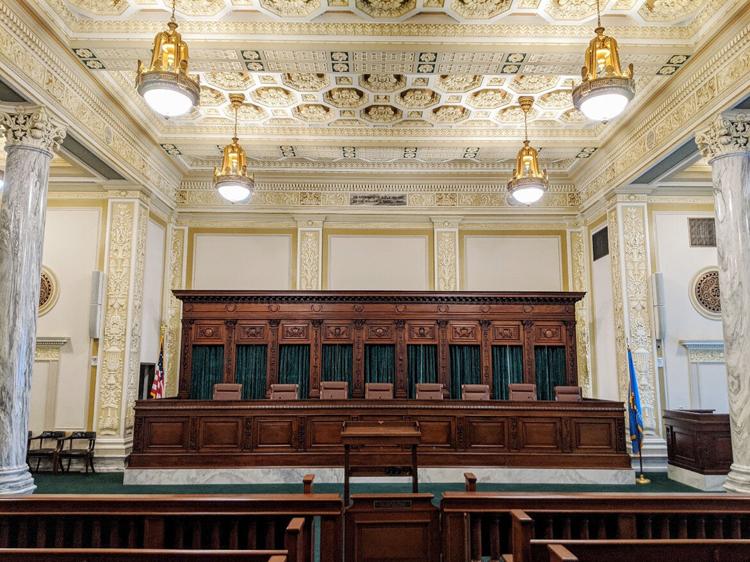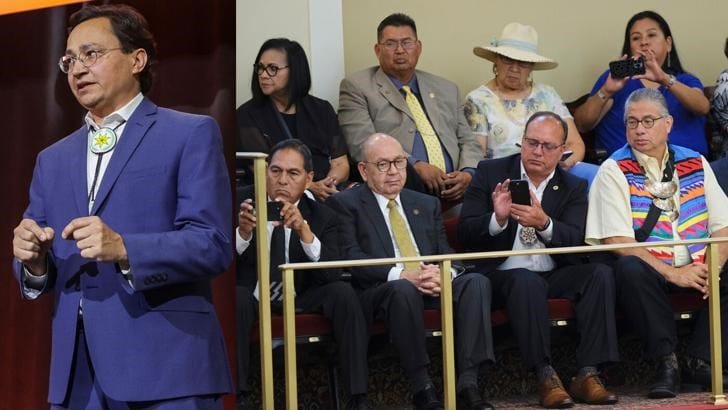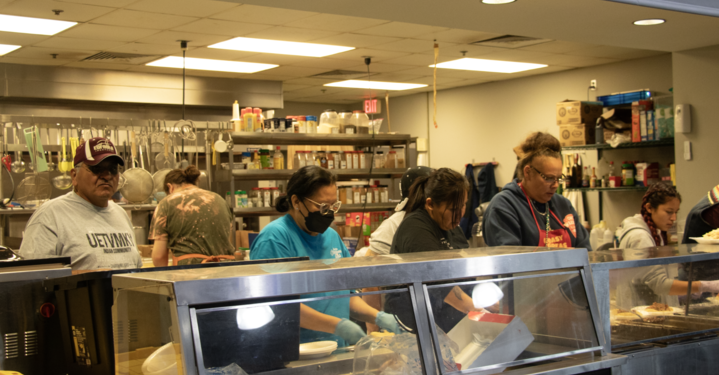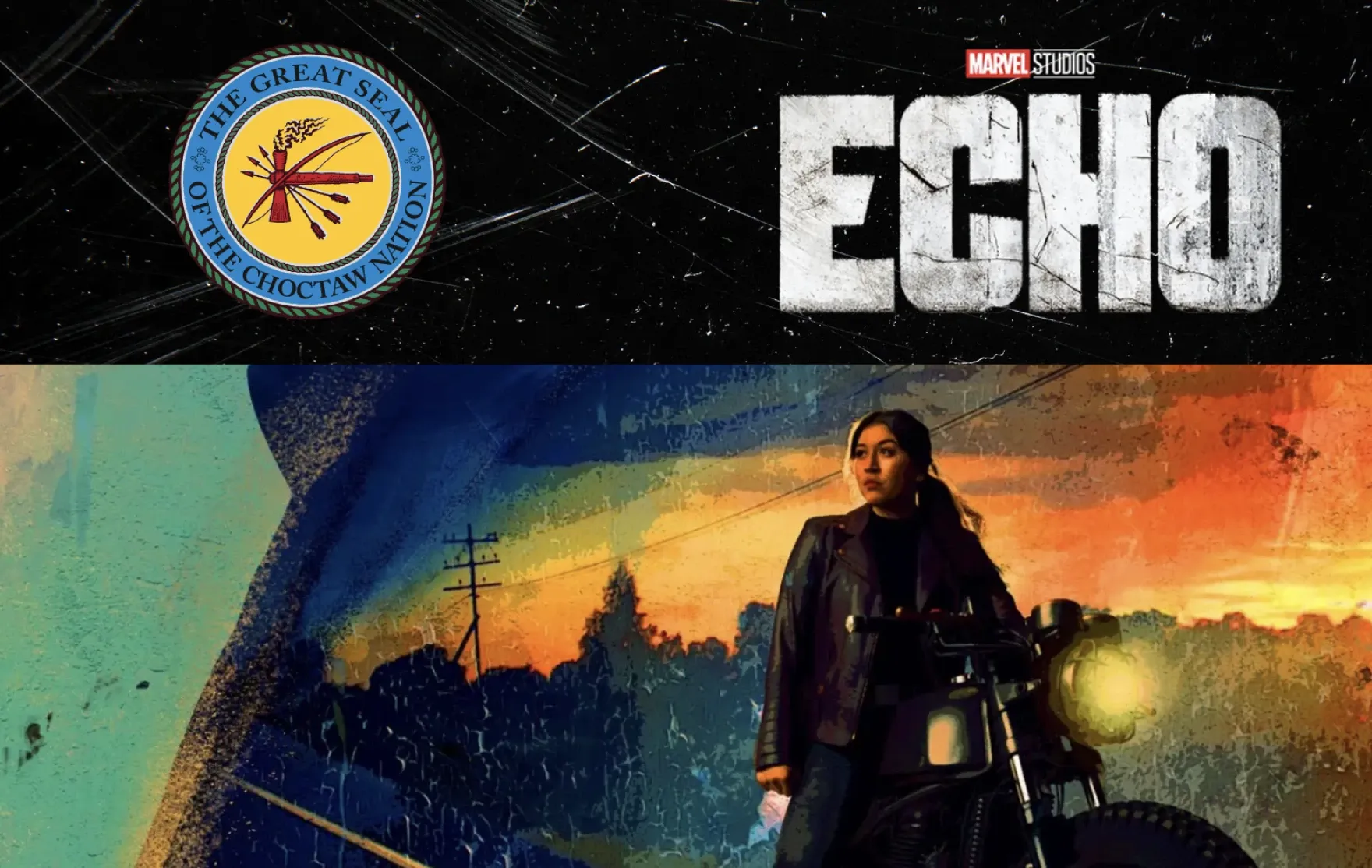

Oral arguments to be heard in tribal income tax protest case

by Curtis Killman, Tulsa World
The Oklahoma Supreme Court will hear oral arguments Wednesday in a case to decide whether the state can tax the income of a Muscogee Nation tribal member and employee who lives and works within the tribe’s 11-county reservation.
A decision in the tribal member’s favor could cost the state tens of millions of dollars in refunded and future income taxes.
Muscogee Nation employee Alicia Stroble is seeking an exemption from state of Oklahoma individual income taxation based in part on the U.S. Supreme Court’s landmark 2020 McGirt ruling.
The decision determined the Muscogee Nation reservation to be still intact for criminal jurisdiction purposes despite the widely held belief that it was dissolved at statehood.
The Supreme Court reasoned that since Congress never disestablished the reservation and Congress was the only entity that could do so, the reservation still exists.
The ruling has since been applied to grant reaffirmed reservation status to most tribes in eastern Oklahoma.
Stroble claims that under the McGirt ruling and others prior to it, the state is prohibited from taxing her income under federal law.
The Oklahoma Tax Commission counters in legal filings that the McGirt ruling relates only to criminal cases and does not address civil matters such as taxes.
The Okmulgee woman in December 2020 requested an exemption from state individual income tax for the years 2017, 2018 and 2019 under state Tax Commission rules previously in place for tribal-based exemptions.
For years, Oklahoma has permitted individual state income tax exemption for certain tribal members when they live and work on land of a tribe of which they are a member. Prior to the McGirt ruling, the number who qualified for the exemption was relatively small, linked to those working and living on land owned by the tribe or land held in trust for the benefit of the tribe.
But since the McGirt ruling was issued, the Tax Commission has been fielding hundreds of exemption requests from tribal members who live on nontribally owned land within the reservation.
The agency had received about 750 citizen protests related to tribal-related income tax exemptions as of August, according to an agency spokeswoman. The agency did not respond to a request for updated figures.
Court filings in the case before the Oklahoma Supreme Court indicate that the matter could come down to the definition of “Indian Country.”
The agency claims that its definition of Indian Country is limited to either a formal or informal reservation, a dependent Indian community or an Indian allotment and that Stroble’s situation doesn’t fit any of the scenarios.
The state agency defines an informal reservation as including “lands held in trust for a tribe by the United States and those portions of a tribe’s original reservation which were neither allotted to individual Indians, nor ceded to the United States as surplus land, but were retained by the tribe for use as tribal lands.”
Noting that Stroble lives on Okmulgee County land that she acquired fee title to from a nontribal grantor, the Tax Commission claims that her residence does not qualify her for the tax exemption.
“To the contrary, appellant’s purchase from a non-tribal grantor shows that, although the parcel may have been conveyed to the Creek Nation, it was long ago allotted and sold,” the state agency claims in court filings.
Stroble’s exemption request was initially rejected by the Tax Commission in April 2021 because she didn’t live on either restricted or trust land.
But an administrative law judge who heard her subsequent appeal ruled in April 2022 that Stroble qualified for the exemption, finding that she lived within the Muscogee Nation’s recently affirmed reservation.
But later that same month, the Oklahoma Tax Commission vacated the administrative law judge’s ruling after finding that Stroble did not qualify for the exemption.
Stroble contends that the reservation status of land depends on boundaries drawn by Congress rather than on who owns the land inside the reservation.
“Once a block of land is set aside for an Indian reservation and no matter what happens to the title of individual plots within the area, the entire block retains its reservation status until Congress explicitly indicates otherwise,” Stroble claimed through attorney Michael Parks, whose filing quoted from an earlier U.S. Supreme Court ruling.
Parks also cites an Oklahoma Tax Commission report issued after the McGirt ruling as evidence in support of Stroble’s position.
The report, issued in September 2020, determined that the state was banned from taxing the income of individual tribal members as long as the tribal member lives and earns the income from sources within Indian Country under the jurisdiction to which the member belongs.”
The report found that since the Muscogee reservation was never disestablished, tribal members who lived within the reservation boundaries were exempt from state income tax.
The report estimated that the expanded requirements for tax exemption could cost the state more than $21 million per year for the Muscogee Nation and nearly $73 million per tax year when the other four major tribes in the state — the Choctaw, Cherokee, Chickasaw and Seminole nations — are included.
The Tax Commission, in legal filings, distanced itself from the report.
The agency claimed that the report was issued by its executive director without the commission’s knowledge.
“The report was issued by the Executive Director of the Commission, not the Commission itself, and so does not amount to an official position of the Commission,” according to a footnote in the OTC brief to the state Supreme Court.

Oklahoma's Five Tribes unify to reject Stitt's task force on McGirt impact

by Felix Clary, Tulsa World
Oklahoma’s Five Civilized Tribes are unified in rejecting Gov. Kevin Stitt’s planned task force on the impact of the U.S. Supreme Court’s McGirt decision, all agreeing that it operates under false assumptions about the ruling.
Their letter notifying the governor of their rejection was released Tuesday evening, following last week’s Inter-tribal Council meeting at the River Spirit Casino in Tulsa.
They said Stitt’s executive order creating the panel does not give enough seats to tribal representatives.
Two of the 13 seats on the task force were reserved for tribal leaders. The Cherokee, Chickasaw, Choctaw, Muscogee and Seminole tribes called for one representative per tribe on the task force.
“The structure of any task force must also reflect respectful government-to-government dialogue with each of the 38 unique tribes in Oklahoma. The State has no authority to mandate any Tribe to defer to another Tribe to speak on its behalf. When we have a willing partner at the State of Oklahoma, we are fully prepared to move forward,” they wrote.
Stitt said in his order that the initiative followed a police scuffle between the Muscogee tribal police and Okmulgee city police at the Okmulgee County jail last month.
“The primary function of government is to protect public safety, and the McGirt decision has created confusion and tension among those that work to serve that function,” Stitt said in his Executive Order 2023-32.
During the scuffle, tribal officers and Okmulgee jailers argued over who had jurisdiction. Stitt blames McGirt for this confusion, and his task force was posed as a solution.
The tribes indicate in their letter that the executive order paints a false picture of the McGirt ruling.
“At its core, the McGirt v Oklahoma decision is a pro-public safety ruling. … Rather than cause uncertainty and wreak havoc, as the Executive Order claims, the McGirt decision has finally restored legitimate legal jurisdiction under clear federal laws and the U.S. Constitution.”
The letter indicates that with certain alterations to the task force, an agreement may be reached.
“We are eager to work with our friends and neighbors to improve coordination in public safety efforts.”
For now, they said they stand in opposition, stating that the design of the executive order indicates an effort to “divide rather than unify and to make political points rather than seek genuine solutions.”
The Governor’s Office did not respond to Tulsa World calls Wednesday requesting comments about the letter.
The McGirt decision gave tribal sovereignty to tribal nations and their police forces in ruling that criminal cases involving tribal members on tribal lands should not be tried in state court but rather tribal court, unless the crime falls under the Major Crimes Act (1885), in which it would be tried in federal court.
The next quarterly meeting for the Inter-tribal Council is set for April 17-19, hosted by the Chickasaw Nation at the WinStar Casino in Thackerville.

Native Wings Like An Eagle offers assistance for tribal citizens released from prison

Founder Melvin Battiest shares the story of his journey serving reformed convicts
by Shayln Proctor, Mvskoke Media
OKLAHOMA CITY, Okla.- Native Wings Like an Eagle Incorporated is a 501(c) nonprofit organization based in Yukon, Oklahoma. It was founded by Melvin (Mvskoke) and his wife Tammeria (Mvskoke) Battiest. The mission of this organization is to reach out and help with reintegration assistance for tribal citizens recently released from prison. Specifically, it helps Native Americans who live off of their reservation, but within the state of Oklahoma.
According to Melvin, this organization is a member of the American Indian Chamber of Commerce and Nonprofit Organization in Oklahoma City.
“We are focusing on helping Natives because as Native people you have to deal with them in a whole different way because we are different people than most people. We still have our culture, and we are still proud of who we are, and we are still here,” Melvin said.
Melvin knows that some former convicts may not want to move onto their reservation due complicated feelings stemming from toxic environments from their past. In order to be successful moving forward after their prison release, these men and women do not want to return to former bad habits or situations.
Native Wings Like An Eagle helps fulfill the needs for recently released convicts who are tribal citizens but do not want to return to their reservation. This provides them with a fresh start. Currently, the organization has an emergency service for reformed convicts who have just been released. This service provides a place to stay, clothing, food and transportation passes for up to three months.
Melvin wants to reintegrate program participants by changing their way of thinking. When an individual is in prison, they are in a much different environment that can alter their mental state. Without proper reintegration, it poses problems for individuals returning to society.
“Our goal is to change their way of thinking and get that prison mentality out of them and give them a new start and a new way of thinking so they can be successful out here,” Melvin said.
Melvin’s Past
Melvin is from the Wetumka area and is currently 63 years old. At 23 years old Melvin was convicted of a felony murder charge in 1984 and was incarcerated until the age of 60. He served 37 years and nine months of a life sentence for a crime he claims that he did not commit. Melvin’s time in prison was an experience he has embraced because he believes it made him into the person he is today with the purpose of serving others.
Growing up Melvin attended Chilocco Indian Agricultural School and the Eufaula Indian Boarding School. Melvin noted that attending these schools helped prepare him for prison life. In both institutions he was subjected to rigid discipline and stern oversight.
When the McGirt case reaffirmed the Muscogee (Creek) Nation’s tribal sovereignty and jurisdiction, Melvin filed a petition in the Oklahoma court system for release. This was based on the argument that the state had no jurisdictional authority prosecuting a Native American in Indian Country. As a result, Melvin’s state conviction was thrown out and he was indicted.
A decade earlier during Melvin’s sentence he contacted the Muscogee (Creek) Nation Reintegration Department. The department enrolled Melvin into their program and initially told him that they could help him once he was released from prison. When Melvin was eventually released, he wanted to live in the Oklahoma City area. However, since Oklahoma City does not reside within the Muscogee (Creek) Nation jurisdiction boundaries, the tribe was initially limited in the assistance they could provide him. Melvin would be granted assistance on the condition that he drive to the reintegration office in person, a trip spanning over 100 miles. Unfortunately for Oklahoma Native Americans that live off of their reservation like Melvin, they are limited in receiving tribal services as well.
During his 37 years in prison Melvin made special bonds with the people he met there. He now views them as his family. Melvin wants to give them tools for success in society with finances, housing, education, employment, and clothing.
“When I got released, I told them that I would not forget them and so my passion is for them to not experience what I experienced. I want to get in front of that so that when they come out they will know without a doubt that if they don’t want to live on their reservation that they will still have help somewhere in Oklahoma living off their reservation,” Melvin said.
Today, Melvin is currently pursuing a degree in sociology and is even receiving help from his tribe for it.
“The element of culture is so important in reintegrating Natives back into their Indian communities and so that’s another thing that our organization is going to do. We are going to put culture elements into their reintegration so that they can grab their culture back,” – Native Prisoner Advocate Melvin Battiest
Finding a New Purpose
Melvin described going to prison as similar to going to war. Without the proper mental health support tools, some reformed convicts may struggle with adapting to live in a society that looks different from the one they left behind. “You are trained mentally to be something that you may not have thought you were before and the whole purpose is surviving the war,” Melvin said.
Additionally, Melvin noticed that some families have a hard time being around formerly incarcerated loved ones because they are not the same person as they were before.
For those being held in prison, Melvin believes it is possible for them to lose their Native American culture. In light of this, Melvin has incorporated Native American celebrations and culture in the services he provides. This includes a sweat lodge in the Oklahoma Department of Corrections, a prison ministry called Native Americans in Christ, Stomp Dances and powwows. These activities are provided for prisoners serving time, and those transitioning back into society.
“The element of culture is so important in reintegrating Natives back into their Indian communities and so that’s another thing that our organization is going to do. We are going to put culture elements into their reintegration so that they can grab their culture back,” Melvin said.
Melvin has received support from many different tribal leaders including Muscogee (Creek) Nation Principal Chief David Hill, Cherokee Nation Principal Chief Chuck Hoskin Jr. and Chickasaw Nation Governor Bill Anoatubby. So far Melvin has reached out to 30 tribal nations in total and is hoping to reach all 39 in the state. Regardless of the response rate, Melvin is still grateful for the support he has received.
While some tribes have reintegration programs of their own, Melvin does not view his work as a competing threat. He specifically wants to help those seeking to live outside of their reservation.
Moving Forward
The Native Wings Like An Eagle is a project still in the works. Currently it is still developing its infrastructure, which includes hiring staff and securing funding. Although Native Wings Like An Eagle has not quite fully taken off yet, that has not stopped Melvin from helping others with funds out of his own pocket. Melvin has traveled to different functions to share his testimony and the story of his organization’s mission, all in an effort to gather funding to keep offering services for reformed convicts.
Melvin and Tammeria go back inside different prisons to help those in need of assistance. So far, they have been to Great Plains Correctional Facility in Hinton, Lexington Assessment & Reception Center, and the Joseph Harp Correctional Center. The couple is prospectively looking to add Mabel Bassett Correctional Center in McLoud to that list as well.
Melvin views their work as a big responsibility in order to help those in need and let others know that even though he was in prison for nearly 38 years, he still made a life for himself. In his travels he has seen many other incarcerated men and women he believes can make it in life too, if only they received a second chance.
Native Wings Like an Eagle was asked by the Oklahoma Alliance Organization to help put on a Native American Heritage month event at their facility. It was a full day of celebration. The celebration’s festivities included Indian tacos, drumming, dancing, and singing in the Mvskoke and Kiowa languages. Native actor Chris Hill was also in attendance to tell stories.
Melvin and Tammeria have also been invited to attend the 2024 Presidential Prayer Breakfast in Washington D.C. They will meet senators, representatives and possibly the president. Different Native Americans were chosen from around the country to join for community prayer. According to Melvin, this event will not only provide prayers for the nation, but it will also provide prayers for other countries around the world.
To keep up to date on the Native Wings Like An Eagle organization’s updates and events, follow their Facebook page, Native Wings Like an Eagle.
Choctaw Nation launches educational site alongside release of Marvel's "Echo"

By Ben Abrams, KOSU
The Choctaw Nation of Oklahoma is getting the superhero treatment.
The Marvel miniseries Echo, featuring a protagonist from the tribe, was released for streaming to Disney+ and Hulu last week.
In tandem with the release of the show, the Choctaw Nation launched an educational website covering parts of Choctaw language and culture seen in the series.
"We wanted to have resources available to tell [audiences] the accurate history," said Seth Fairchild, the Choctaw Nation's director of culture.
Fairchild said the question for the communications team was "once we spark people's interest, how do we educate them about our culture?"
Echo is the latest TV & film project to feature one of Oklahoma's native communities, with Reservation Dogs and Killers of the Flower Moon highlighting the stories from the Muscogee and Osage nations.
Marvel and the Choctaw Nation collaborated on the series to ensure accuracy.
In a promotional video, Choctaw Chief Gary Batton said he thinks "it's an exciting time for our Choctaw people to be recognized for our contributions that we've made."
Fairchild said other projects involving the Choctaw Nation have not been as involved in the past. He said other productions have sometimes already written or filmed stories involving Choctaw culture before approaching the nation for accuracy.
"They'll write it, they'll film it, and then they come to us and say 'hey, we want you guys to review this,'" Fairchild said. "Sometimes there's major changes that need to take place."
"The best situation is when these companies will go to indigenous populations on the front end and say, just like Marvel did, 'walk alongside us through this process,'" he said.
Fairchild said he hopes that kind of model can become standard practice for future productions involving stories about Native Americans.
You can learn more about the Echo series and the elements of Choctaw culture shown by visiting the Marvel ECHO x Choctaw Nation website.



